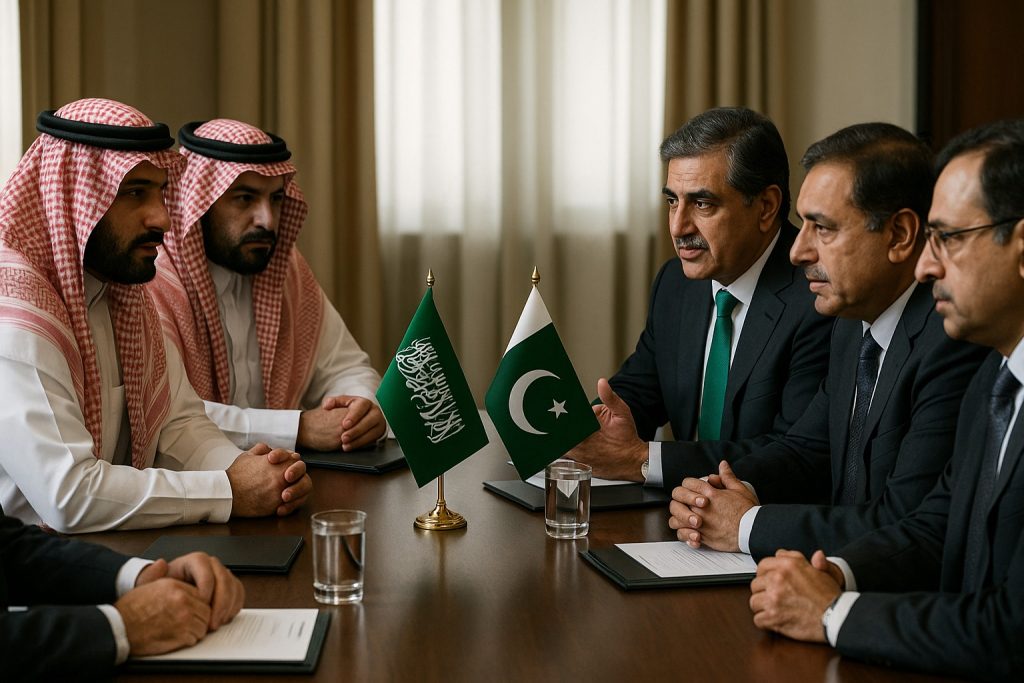Pakistan and the Kingdom of Saudi Arabia (KSA) have signed a strategic mutual defense agreement (SMDA) on September 17, 2025, cementing decade’s long security partnership between Islamabad and Riyadh. This new mutual defense pact strengthens previous agreements with Riyadh that date back to the 1960s, further reiterating the principle that “aggression against either country shall be considered aggression against both.” Pakistan–Saudi agreements (past or present) are political pledges of solidarity and cooperation, but they do not create a treaty-based, institutionalized collective defense system like NATO. While many analysts argue that this deal covers Pakistan’s nuclear weapons, the reality is that this agreement augments the already existing strategic partnership rather than providing Saudi Arabia with a nuclear umbrella. Neither Pakistan’s nuclear policy nor its doctrine entails providing extended nuclear deterrence to any other state while Islamabad’s deterrence posture remains India-specific and does not extend to providing a nuclear umbrella to any state
Islamabad and Riyadh have been tied in a mutual defense pact for decades. Pakistani forces which account for 1500-2000 troops, provide operational and technical help to Saudi forces. In regional conflicts, Pakistan has been safeguarding Saudi frontiers under defense protocol of 1967. Over the course of time, Pakistan has trained approximately 8000-10,000 Saudi military personnel and periodically stationed these units in the Kingdom. The recent strategic mutual defense agreement further strengthens the historical deep alliance between Pakistan and KSA, rather than creating a new pact. Even previous defense agreements do not guarantee a “nuclear umbrella.” In a similar vein, the recent mutual defense pact between Pakistan and KSA politically serves the purpose of signaling solidarity and strategic cooperation, rather than providing unconditional war guarantee for Saudi Arabia. Pakistan does not seek to assume the role of a regional security guarantor, rather contributes to collective security in line with international law and its national interests.However, Islamabad can be an essential actor in collective security arrangements in the Middle East in accordance with the norms of international law.
As the Israeli air raid on Doha sent shockwaves across globe, Gulf States particularly Saudi Arabia, have realized that the United States is unlikely to go to the defence of its Gulf partners in times of crisis, despite deep ties with the the Kingdom. The reliability of the US as a security guarantor to its Arab partners in the Gulf region has diminished after Israel attacked Qatar that harbors Al-Udaid, the largest US military base in the Middle East with 10,000 active troops. Israel’s attack against Hamas leadership in Doha also infuriated Gulf countries.. However, the lack of action by the US against its ally, Israel, for the airstrikes in Doha has damaged the image of the US as a reliable security partner. Therefore, Arab states are exploring new partners for their security against Israeli aggression. Pakistan, with its battle-tested military and cordial relations with Gulf monarchies, appears to be a natural partner for KSA. Its decades- old alliance with KSA is rooted in deep strategic interests, shared faith and economic interdependence. Pakistan and Saudi Arabia’s partnership is anchored in shared religious affinity, the presence of a 2.7 million-strong Pakistani diaspora contributing over $6 billion in annual remittances, and Pakistan’s reliance on Saudi oil imports for its energy security. These factors deepen mutual trust and economic interdependence. Together, they reinforce the strategic logic behind the Pakistan–Saudi Mutual Defense Pact. Additionally, Pakistan’s participation in Saudi Arabia’s Vision 2030 projects highlights opportunities for long-term economic integration and strategic cooperation.
The cardinal aspect of this new mutual defense pact lies in formalizing a deep alliance which has historical roots. With this agreement, both Islamabad and Riyadh vow joint deterrence against any aggression, institutionalizing their long-standing security cooperation. Both Pakistan and KSA views this pact as an outcome of decades old partnership, not a sudden alliance aimed at any adversary, as Pakistani officials reiterated in their statements. Similar to the previous defense agreements between Islamabad and Riyadh, this agreement does not offer any nuclear guarantee to KSA. Therefore, the idea of a nuclear umbrella remains speculative, and the actual text of this mutual pact, along with Pakistan’s stated nuclear doctrine, does not support it. Operational readiness and interoperability of both states’ armed forces will be significantly improved under this pact. This pact will foster defense industry collaboration on emerging technologies such as cybersecurity, drone technology and space-based defense systems between both states. It will enable the co-production of conventional military equipment as well, paving the way for a promising future of strategic cooperation between Islamabad and Riyadh. It may also be pointed that Pakistan has not offered a covert “nuclear button” to Riyadh and defense cooperation with Riyadh does not imply an automatic war pledge. While addressing the 80th session of the United Nations General Assembly (UNGA), Iranian President, Masoud Pezeshkian, also praised this defense deal between the two brotherly Muslim states, marking the pact as the beginning of a comprehensive regional security system. Pak-Saudi mutual defense pact enhances Pakistan’s strategic depth by reinforcing its defense cooperation with the Muslim world’s most influential state, thereby expanding Islamabad’s diplomatic leverage beyond South Asia. The pact bolsters Pakistan’s deterrence posture vis-à-vis India, as Riyadh’s political and strategic backing adds weight to Pakistan’s regional standing. Economically, it promises deeper defense collaboration, potential joint production, and technology transfer. In December, KSA loaned Pakistan $ 3 billion, shoring up its foreign exchange reserves. While politically, it reflects growing confidence in Pakistan’s professional military capability and responsible nuclear stewardship. In essence, the agreement strengthens Pakistan’s strategic autonomy, broadens its alliances, and projects it as a pivotal player in the evolving security architecture of the Muslim world.
This article was published in another form at https://globalsecurityreview.com/understanding-the-pakistan-saudi-defense-agreement/
Ms Nawal Nawaz is Research Assistant at the Center for International Strategic Studies (CISS), Islamabad.

